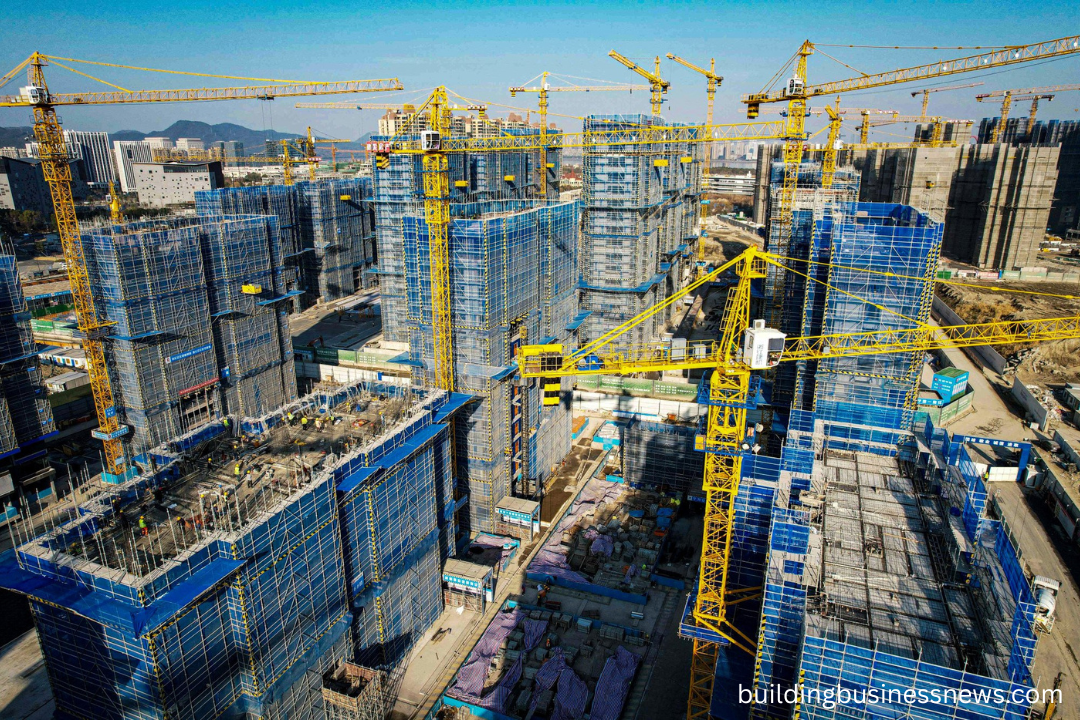China’s property sector is gradually emerging from its prolonged slump, bringing cautious optimism to domestic and global markets. After years of regulatory crackdowns, overleveraged developers, and declining sales, new data indicates that the sector may be stabilizing. This revival is viewed as a crucial factor in reviving broader economic momentum in the world’s second-largest economy.
Government interventions, including interest rate cuts, relaxed mortgage rules, and liquidity injections, are beginning to yield results. While challenges remain, signs of renewed activity in housing sales, construction projects, and access to financing are revitalizing China’s property outlook.
The Downturn That Shook China’s Economy
China’s property market crisis began around 2020 when tighter regulations aimed at reducing debt in the real estate sector led to defaults by major developers, such as Evergrande. As sales plummeted and consumer confidence waned, the once-booming property industry—contributing roughly 25% of China’s GDP—fell into disarray.
This downturn affected millions of homeowners, construction firms, and investors, triggering a domino effect across related industries. The severity of the slump made it clear that a recovery in China’s property sector was essential for broader economic stabilization.
Government Measures Driving Recovery
Policymakers have since taken a more accommodative stance to revive confidence in the housing market. Key measures include:
- Lowering mortgage rates for first-time buyers
- Reducing down payment requirements
- Encouraging banks to lend to qualified developers
- Offering subsidies to stimulate property purchases
These strategies are beginning to impact market behavior. Recent reports indicate a modest increase in home sales in key cities while previously halted construction projects are resuming. These are positive signs that China’s property market is responding to stimulus efforts.
Housing Demand Rebounds in Urban Centers
First- and second-tier cities, such as Beijing, Shanghai, and Shenzhen, are showing the strongest signs of recovery. Buyers are returning, driven by price adjustments, improved financing conditions, and government support.
China’s property developers, many of whom struggled with liquidity, are also adapting by focusing on completing existing projects rather than aggressive expansion. This shift enhances market trust and reduces the number of unfinished or delayed developments.
Rising transaction volumes in metropolitan areas suggest that the worst may be over, at least for China’s property landscape in urban hubs.
Developer Landscape Sees Major Shifts
The collapse of overleveraged companies has reshaped the competitive landscape. While some private developers remain under pressure, state-backed entities are gaining ground. These firms are better positioned to receive financial backing and manage long-term projects, giving them an edge in the recovering market.
This transition is also leading to greater regulatory oversight and structural reform, making China’s property industry more resilient. Investors are now more focused on transparency, accountability, and sustainability, elements that were often overlooked during the boom years.
Real Estate Investment Regains Appeal

Global and domestic investors are slowly regaining confidence in China’s property market. Investment firms are eyeing opportunities in commercial real estate, logistics hubs, and housing developments backed by government incentives.
Real estate investment trusts (REITs) in China have also become more attractive. These financial instruments provide investors with a means to gain exposure to China’s property sector without directly owning physical assets, thereby adding diversification and liquidity to their portfolios.
The rebound in investor sentiment reflects a broader belief that China’s property sector has turned a corner.
Economic Implications of Property Revival
China’s property market is tightly intertwined with other sectors, including construction, steel, cement, and banking. A revival in the real estate sector contributes to job creation, increased consumer spending, and higher economic output.
Improved housing market stability also supports the financial sector by reducing the risk of loan defaults and boosting banking activity. As confidence returns, so does credit flow, enabling further business and consumer investments.
For China to achieve its GDP growth targets, a sustained recovery in the property sector is not just beneficial—it is essential.
Regional Disparities in Market Performance
While top-tier cities lead the recovery, smaller towns and rural areas continue to face pressure. These markets face oversupply, lower demand, and weaker local economies, making it harder for the recovery to take root evenly across the country.
China’s policymakers may need to introduce more targeted measures to support these regions, including infrastructure investment and urban development initiatives. Bridging the performance gap is crucial for the nationwide stabilization of China’s property market.
Consumer Confidence Begins to Rebuild
One of the biggest challenges during the downturn was eroded consumer confidence. Homebuyers were reluctant to invest in projects that might remain incomplete or lose value over time.
As China’s property developers focus on completing existing projects and the government enforces stricter regulatory compliance, trust is beginning to return. New homebuyers are showing increased interest, especially in projects backed by large or state-owned developers with strong reputations.
A confident consumer base is vital for sustained growth in China’s property sector.
Foreign Investors Monitor the Rebound
Foreign investment firms and hedge funds are closely monitoring China’s property market. Some are exploring opportunities in distressed assets, while others are positioning for long-term gains as conditions improve.
China’s willingness to open specific parts of the market to foreign capital, coupled with ongoing reforms, adds to its appeal. However, transparency and regulatory clarity will remain key to attracting and retaining foreign investment in China’s property sector.
Risks That Could Derail the Recovery
Despite positive momentum, risks remain. These include:
- Potential resurgence of COVID-related disruptions
- Global interest rate hikes affecting funding costs
- Geopolitical tensions impacting investor sentiment
- Slower-than-expected economic growth in China
Should any of these risks materialize, they could stall the fragile recovery in China’s property market. Vigilant policy management and continued stimulus efforts are necessary to keep the sector on track.
Long-Term Outlook for China’s Property Market
China’s property sector is unlikely to return to its hypergrowth era, but a more sustainable and regulated industry is emerging. The government’s shift toward promoting rental housing, green buildings, and urban renewal indicates a strategic pivot.
This long-term transformation aims to reduce speculation, boost housing affordability, and ensure that the property market serves broader economic goals. For investors and stakeholders, the focus now is on stable, value-driven growth rather than rapid, leveraged expansion.
Frequently Asked Questions (FAQ’s)
What caused the downturn in China’s property sector?
China’s property sector declined due to excessive developer debt, government crackdowns on speculative lending, and a decline in homebuyer confidence. Major firms, such as Evergrande, defaulted, exacerbating the crisis.
How important is China’s property market to the national economy?
China’s property market accounts for approximately 25% of the country’s GDP. It influences employment, banking, construction, and overall economic stability.
What signs indicate that China’s property market is recovering?
Indicators include rising home sales in major cities, the resumption of construction on stalled projects, increased mortgage approvals, and improved investor sentiment.
How is the Chinese government supporting the property sector?
The government has cut interest rates, relaxed mortgage rules, reduced down payment requirements, and encouraged banks to lend to qualified developers.
Are all regions in China experiencing property market recovery?
Recovery is uneven. First- and second-tier cities, such as Shanghai and Beijing, are showing improvement, while lower-tier towns continue to face oversupply and weak demand.
What role do state-backed developers play in the revival?
State-owned developers are leading the way in completing projects, benefiting from improved access to financing and government support, which in turn boosts market confidence.
Is foreign investment returning to China’s property sector?
Yes, foreign investors are gradually regaining interest, especially in commercial real estate and distressed assets, though they remain cautious about market volatility.
What are the long-term prospects for China’s property market?
The market is shifting toward sustainability, driven by increased regulatory oversight. While rapid growth may not return, steady and more stable development is expected.
Conclusion
China’s property sector is showing encouraging signs of revival after years of instability. Through government intervention, market reforms, and changing investor sentiment, the outlook for China’s property market has become more hopeful.
Although challenges persist, particularly in lower-tier regions and among struggling developers, the foundations for a recovery are being laid. As China navigates its economic future, a healthier and more resilient property sector will be a cornerstone of sustained national growth.

